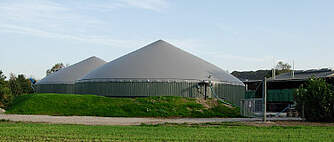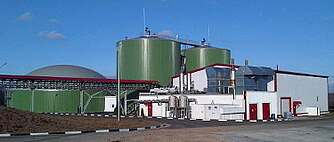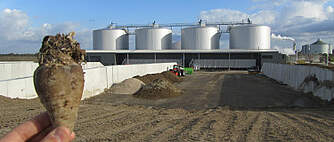(...)
Bioerdgas Isenhagen (Germany): 2023/24
The latest project by Krieg & Fischer Ingenieure shows the installation of a CO2 liquefaction plant in combination with a biogas upgrading plant for two existing biogas plants of LSW Energie GmbH.
The project Bioerdgas Isenhagen will replace the existing biogas processing plant and involves the installation of a biogas to biomethane upgrading and CO2 liquefaction plant producing food-grade quality CO2. 1,400 Nm³/h of biogas will be sourced from two existing plants that use renewable raw materials and manure and from a nearby wastewater treatment plant (200 Nm³/h of biogas from potato processing waste). These three biogas flows will be integrated into the processing plant to produce 750 Nm³/h of biomethane, which will be fed into the local natural gas network.
The separated CO2 will be liquefied, stored temporarily on site, and sold. Production of liquefied CO2 will be about 1,1 t/h. It is also planned to implement a Dry-Ice production of 1.000 t/a. The proximity allows otherwise emitted Off-Gas to be reliquefied in the liquefaction plant.
The plant complies with all relevant regulations, including EU regulations, DIN standards, safety rules for biogas plants, operational safety regulations, and WHG and DVGW regulation.
Krieg & Fischer engineering team carries out the integration of the biogas upgrading and CO2 liquefaction with the pre-existing biogas plants, determining suitable biogas extraction points, purification and function of the gas system, as well as using waste heat and coordinating between multiple heat and electricity consumers. CO2 liquefication consumes quite a bit of electricity (0,21 kWh/kg liquid CO2) and at the same time produces heat that comes from the compressor. So, part of the biogas is used at the existing CHPs that will supply the plants on site with electricity.
Waste heat from the biogas upgrading and CO2-liquefaction plant's compressors will be used to heat the digesters. The remaining heat needed for the digesters will be supplied from CHPs. Excess CHP heat is used for heating in the nearby villages.


